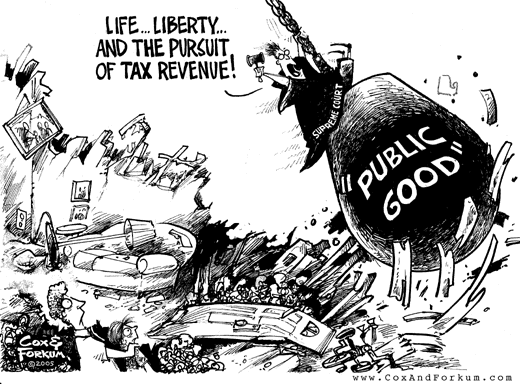In another heavy blow to property rights, the Supreme Court has ruled against the homeowners in the New London, Connecticut, eminent domain case, and further entrenched the legal principle that government can seize an individual’s property for “public use” whenever it deems appropriate.
The justification the Court offered for violating the property rights of
But it should not matter that the government’s seizure of legally owned property might increase tax revenue or supposedly benefit the local economy. If a person does not want to sell his property, he should not be forced to do so.

Cartoon by Cox and Forkum
Even though the Fifth Amendment to the U.S. Constitution makes it legal for the government to use eminent domain, there is, in fact, no moral justification for the violation of property rights. Individual rights should never be sacrificed, and certainly not to promote some alleged and indefinable “public” good.
As this case demonstrates, “public use” is a term so vague as to have given government virtually unlimited power in using eminent domain to take property away from its legitimate owners.
And as Ayn Rand has pointed out, the “public” as such does not exist. Only individuals exist. Whenever governments act to promote the “public” good, or to advance a “public” purpose, or to satisfy a “public” need–beware. For what invariably happens in such cases is that some individuals are forced by the state to sacrifice for other individuals.
It is no coincidence that appeals to the “public” good have been used by dictatorships throughout history to justify tyranny over the individual. Thanks to the deplorable decision by five justices of the Supreme Court,
Copyright









